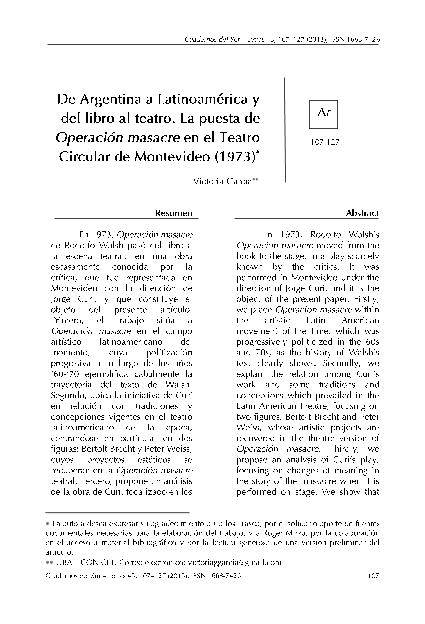Artículo
En 1973, Operación masacre de Rodolfo Walsh pasó del libro a la escena teatral, en una obra escasamente conocida por la crítica, que fue representada en Montevideo con la dirección de Jorge Curi, y que constituye el objeto del presente artículo. Primero, el trabajo sitúa a Operación masacre en el campo artístico latinoamericano del momento, cuya politización progresiva a lo largo de los años 60-70 ejemplifica cabalmente la trayectoria del texto de Walsh. Segundo, ubica la iniciativa de Curi en relación con tradiciones y concepciones vigentes en el teatro latinoamericano de la época, centrándose en particular en dos figuras, Bertolt Brecht y Peter Weiss, cuyos proyectos estéticos se recuperan en la Operación masacre teatral. Tercero, propone un análisis de la obra de Curi, focalizado en los desplazamientos de sentido que experimenta la historia de la masacre al ser transpuesta al teatro. Según podrá verse, el pasaje del libro al teatro hace de Operación masacre un acontecimiento, evanescente en la medida en que el espectáculo inevitablemente termina pero que, mientras dura, constituye la puesta en acto, encarnada en múltiples cuerpos y voces, del pasado violento que persiste en el presente latinoamericano del comienzo de la década de 1970. In 1973, Rodolfo Walsh’s Operación masacre moved from the book to the theatre scene, in a play scarcely known by the critics, which was represented in Montevideo under the direction of Jorge Curi, and which constitutes the object of the present paper. Firstly, we situate Operación masacre within the artistic field of the moment, progressively politicized during the 60-70 years, as clearly shows the history of Walsh’s text. Secondly, we explain the relation beteween Curi’s work and some traditions and conceptions which prevalied in the Latin American theatre of the period, centering in tho figures, Bertolt Brecht and Peter Weiss, whose artistic projects are retaken by the theatrical Operación masacre. Thirdly, we propose an analysis of Curi’s play, focused on the sense displacements that the story of the massacre undergoes when it is transposed to the theatre. We show that the fact of having passed from the book to the theatre turns Operación masacre into an event, evanescent as the performance will inevitably end up, but which represents, as it goes on, the acting of a violent past which persists in Latin American 1970’s present, and is interpreted by a plurality of bodies and voices.
De Argentina a Latinoamérica y del libro al teatro: La puesta de Operación masacre en el Teatro Circular de Montevideo (1973)
Fecha de publicación:
12/2013
Editorial:
Universidad Nacional del Sur. Departamento de Humanidades
Revista:
Cuadernos del Sur
ISSN:
1668-7426
Idioma:
Español
Tipo de recurso:
Artículo publicado
Clasificación temática:
Resumen
Palabras clave:
transposición
,
arte y política
,
teatro documental
,
literatura testimonial
Archivos asociados
Licencia
Identificadores
Colecciones
Articulos(SEDE CENTRAL)
Articulos de SEDE CENTRAL
Articulos de SEDE CENTRAL
Citación
García, Victoria Gisele; De Argentina a Latinoamérica y del libro al teatro: La puesta de Operación masacre en el Teatro Circular de Montevideo (1973); Universidad Nacional del Sur. Departamento de Humanidades; Cuadernos del Sur; 43; 12-2013; 107-127
Compartir




